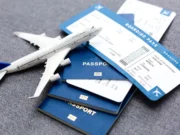Globetrotting has never been more thrilling or affordable, not to mention thanks to the popularization of purpose-built travel cards. Whether it’s a daily commuter or an infrequent traveler, there’s always a travel card that can refine the experience for you with luxury perks, money-back, and extra miles. From complimentary use of airport lounges to price reductions on lodging, these travel cards have quite a lot on offer that transforms every journey smoother and more remunerative.
Difference Between a Traveler Card and a Regular Debit Card
A traveler card has a special loyalty program for the “Travel” category. It offers increased cashback and miles for purchasing airline tickets, renting cars and housing, free visa insurance, cash withdrawals abroad, and mobile communications in roaming.
Accumulated miles can be used to pay for tickets, rent housing, and cover other travel expenses. Card users may also receive additional bonuses, such as free access to airport business lounges, a personal consultant, or a free transfer.

Benefits of Travel Cards
Each bank offers its bonus package. Some of the most popular benefits include free insurance for travel abroad, baggage insurance during flights, the ability to purchase airline or train tickets using accumulated miles, and cash withdrawals worldwide without commission.
Other benefits include discounts on foreign taxi services, increased cashback on travel purchases, access to business lounges at international airports, priority boarding, free mobile internet or Wi-Fi abroad, and 24/7 support and legal assistance.
Accumulating Miles
Miles are cumulative points that can be spent on purchases. Each bank determines how they can be obtained, what they can be spent on, and the duration for which they remain valid. Most often, 1 mile is equal to 1 ruble.
On traveler cards, points are typically earned for any purchase, but higher rewards are given in the “Travel” category. Miles can be accumulated quickly when purchasing train or plane tickets, renting hotels, apartments, or cars, or buying from the bank’s partners.
Some banks offer welcome miles to new cardholders. For instance, PSB Bank provides 500 welcome bonuses on the “World without Borders” travel card.

Spending Miles
Miles are primarily used for airline tickets and hotel reservations. Let’s look at an example of how one can accumulate a sufficient number of bonuses within a given time frame.
Example: Saving for Airline Tickets
Mikhail wants to save for a Moscow-Budapest ticket for a trip in November 2022. Round-trip tickets cost about 10,500 rubles. To ensure he has enough miles, he aims to accumulate 12,000 bonuses, considering possible price increases.
Mikhail has a travel card from SberBank, SberCard Travel. On the bank’s website, he can use a special calculator to estimate the required monthly spending. To accumulate 12,000 miles by November 2022, Mikhail needs to spend at least 67,000 rubles per month on the SberCard Travel card.
Example: Saving for Hotel Reservations
Inna plans to book a hotel in London for seven days at the end of 2022 for 75,500 rubles. She wants to accumulate 76,000 points to pay using the Raiffeisen Buy&Fly card.
This card offers 4 miles for every 100 rubles spent if the total monthly spending exceeds 75,000 rubles. To reach 76,000 miles in a year, Inna needs to spend at least 157,000 rubles per month on the traveler’s card. She can also use an online calculator on the bank’s website to estimate her earnings.
Read more: First Trip Abroad
Choosing the Right Travel Card
Cost of Service
When applying for a card, it is important to consider not only the annual service fees but also additional costs. These include fees for cash withdrawals at other banks’ ATMs, transfer fees, and currency conversion charges.

Some banks offer free services but charge high commissions on transfers and currency conversion. It is crucial to evaluate transaction costs based on planned travel expenses.
Debit or Credit Card
Travel cards are available as both debit and credit cards. Even if you have enough funds on your debit card, carrying a credit card as a backup can be helpful in unexpected situations.
Using a credit card strategically can also help earn additional bonuses. For instance, refundable deposits for car rentals, hotels, or equipment can be paid with a credit card. If refunded within the interest-free period (typically 28-31 days), no additional fees apply, and extra miles or cashback can be earned.
A credit card can also assist in unexpected expenses. If the balance is topped up within the interest-free period, no interest is charged, and bonuses continue to accumulate.
Conditions for Accumulating and Using Miles
Understanding the terms for earning and using miles is crucial when selecting a travel card. Some important factors to consider include:
Minimum Spending Requirement: Some cards require a minimum number of miles before they can be redeemed for travel. If you travel infrequently, it is best to choose a card with no minimum redemption restrictions.
Partial Payment Option: Some cards do not allow partial payment in rubles if miles are insufficient. This can be inconvenient if you are just starting to accumulate miles.
Miles Expiry: Many travel cards have expiration dates for accumulated points. If you do not travel frequently, choose a card with a longer or unlimited validity period for miles.
Selecting the Best Travel Card
For Comfortable Travel
If you prioritize comfort, select a card with additional perks like luggage insurance, taxi discounts, airport lounge access, and 24/7 assistance. For example, the Alfa Travel card from Alfa-Bank offers a comprehensive bonus package, including an assistant, extended insurance, cashback on business-class taxi rides, Priority Pass access, and dining discounts.
Home Credit Bank’s Polza Travel card includes concierge service, 24/7 support, and legal assistance, making travel planning and problem resolution easier.
Read more: Travel the World Without Quitting Your Job
For Frequent Travelers
Frequent travelers benefit from cards with high cashback on travel purchases and the ability to store money in multiple currencies. The SberCard Travel from Sberbank allows users to earn up to 10% in SberMiles for purchases abroad and store funds in rubles, dollars, and euros.
Similarly, the Tinkoff ALL Airlines card offers up to 10% in miles for travel expenses and 1.5% for all other purchases, making it an excellent choice for frequent flyers.

For Infrequent Travelers
If you travel only once or twice a year, choose a card with welcome miles and good interest on your account balance. The PSB “World without Borders” card provides 500 welcome miles and a 5% interest rate on the account balance if monthly spending exceeds 25,000 rubles.
Additionally, T-Bank and Home Credit Bank’s travel cards offer up to 30% in miles for partner purchases, allowing travelers to accumulate rewards for future trips without spending directly on flights and hotels.
By carefully considering these factors, travelers can select the most suitable card to maximize benefits while minimizing costs.





















